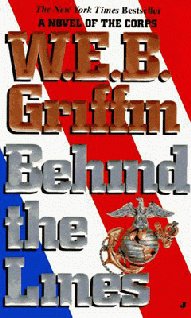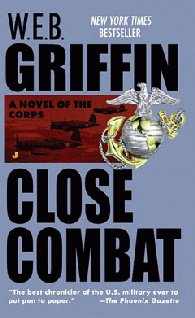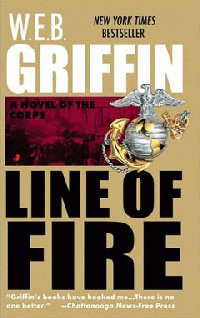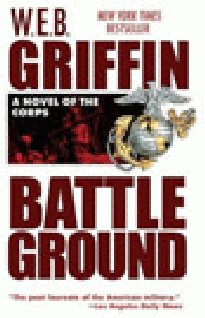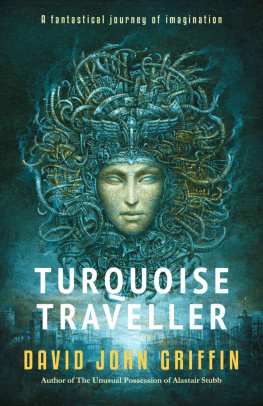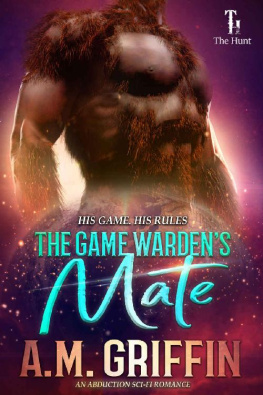Griffin W.E.B. - The Corps 09 - Under Fire
Here you can read online Griffin W.E.B. - The Corps 09 - Under Fire full text of the book (entire story) in english for free. Download pdf and epub, get meaning, cover and reviews about this ebook. year: 0101, genre: History. Description of the work, (preface) as well as reviews are available. Best literature library LitArk.com created for fans of good reading and offers a wide selection of genres:
Romance novel
Science fiction
Adventure
Detective
Science
History
Home and family
Prose
Art
Politics
Computer
Non-fiction
Religion
Business
Children
Humor
Choose a favorite category and find really read worthwhile books. Enjoy immersion in the world of imagination, feel the emotions of the characters or learn something new for yourself, make an fascinating discovery.

- Book:The Corps 09 - Under Fire
- Author:
- Genre:
- Year:0101
- Rating:3 / 5
- Favourites:Add to favourites
- Your mark:
- 60
- 1
- 2
- 3
- 4
- 5
The Corps 09 - Under Fire: summary, description and annotation
We offer to read an annotation, description, summary or preface (depends on what the author of the book "The Corps 09 - Under Fire" wrote himself). If you haven't found the necessary information about the book — write in the comments, we will try to find it.
The Corps 09 - Under Fire — read online for free the complete book (whole text) full work
Below is the text of the book, divided by pages. System saving the place of the last page read, allows you to conveniently read the book "The Corps 09 - Under Fire" online for free, without having to search again every time where you left off. Put a bookmark, and you can go to the page where you finished reading at any time.
Font size:
Interval:
Bookmark:
This document was generated by ABC Amber LIT Converter program
W E B Griffin - Corp 09 - Under Fire
THE CORPS is respectfully dedicated to the memory of Second Lieutenant Drew James Barrett III, USMC Company K, 3d Battalion, 26th Marines Born Denver, Colorado, 3 January 1945 Died Quang Nam Province, Republic of Vietnam, 27 February 1969 and Major Alfred Lee Butler III, USMC Headquarters 22nd Marine Amphibious Unit Born Washington, D.C., 4 September 1950 Died Beirut, Lebanon, 8 February 1984 and To the memory of Donald L. Schomp a Marine fighter pilot who became a legendary U.S. Army Master Aviator RIP 9 April 1989 "Semper Fi!"
Prologue
In 1944, Vice President Henry A. Wallace was perceived by many-perhaps most-highly placed Democrats to be a genuine threat to the reelection of President Franklin D. Roosevelt.
He was cordially detested by the Republicans-and many conservative Southern Democrats-both for his lib-eral domestic policies and his unabashed admiration of the Soviet Union.
Perhaps equally important, the poor-and declining-health of President Roosevelt, while carefully concealed from the American public, was no secret to many Republi-cans, including their probable candidate for the presi-dency, Governor Thomas E. Dewey of New York.
There was a real threat that Dewey might make it an is-sue in the campaign: "Roosevelt, if reelected, probably won't live through his term. Do you want Henry Wallace in the Oval Office? Or me?"
Wallace, it was decided, had to go.
For his running mate, Roosevelt picked Senator Harry S. Truman of Missouri, who, while an important senator, was not part of the President's inner circle.
It was a brilliant political choice. Truman had earned nationwide recognition for his chairmanship of a Senate committee investigating fraud and waste by suppliers of war materials. "The Truman Committee" was a near-weekly feature on the newsreels at the nation's movie palaces, showing a nice-looking man visibly furious at contractors caught cheating the government and the mili-tary officers who'd let them get away with it.
And he couldn't be accused of being antimilitary, either, for he had served with distinction as a captain of artillery in France in World War I, and he had retired as a colonel from the Missouri National Guard.
The Roosevelt-Truman ticket won the election in a land-slide. Vice President Truman appeared with Roosevelt at the inauguration, and then was more or less politely told to go away and not make a nuisance of himself while Roo-sevelt and his far-better-qualified cronies ran the country.
During the first eighty-one days of his fourth term, Pres-ident Roosevelt met with Vice President Truman twice, and they were not alone on either occasion.
On the eighty-second day of his fourth term-April 12, 1945-while vacationing in Warm Springs, Georgia, with a lady not his wife, Franklin Delano Roosevelt died suddenly.
That made it urgently necessary to bring President Harry S. Truman up to speed on a number of matters it had been decided he really didn't have to know about, including a new weapon called the Atomic Bomb.
And to tell him of some disturbing theories advanced by the intelligence community-most significantly the Office of Strategic Services (OSS)-that Josef Stalin had no inten-tion of going back to Mother Russia to lick his war wounds, but rather saw the inevitable postwar chaos as an opportunity to bring the joys of communism to the rest of the world.
There had already been proof:
The U.S.S.R-which was to say Stalin-had forced the King of Romania to appoint a Communist-dominated gov-ernment; Tito's Communists had assumed control of Yu-goslavia; Communists were dominant in Hungary and Bulgaria (where a reported 20,000 people had been liqui-dated). In Poland, when Polish underground leaders ac-cepted an invitation to "consult" with Red Army officers, they had been arrested and most of them had then "van-ished."
And Stalin had made no secret of his intentions. Shortly before the end of the war, the OSS reported, he had told Yu-goslav Communist Milovan Djilas, "In this war each side imposes its system as far as its armies can reach. It cannot be otherwise."
President Harry S. Truman had been in office less than a month when-at 2:41 am. on May 8, 1945, at General Dwight Eisenhower's Reims, France, headquarters-Ger-many surrendered to the Allies.
Three days later, on May 11, 1945, Truman abruptly or-dered the termination of Lend-Lease aid to the U.S.S.R. But then, on the advice of left-leaning Harry Hopkins, Tru-man made what he later acknowledged was a major mis-take. To assure Stalin of American postwar goodwill, he kept silent about the "vanished" and imprisoned Polish leaders, and then recognized the "new" Polish government in Warsaw as legitimate, although he knew that it consisted almost entirely of Soviet surrogates.
In July, Truman met with Stalin at Potsdam, Germany, outside Berlin. Truman came away convinced that Roo-sevelt was wrong: "Uncle Joe" could not be treated like a difficult senator and bribed with a couple of highways and a new post office in his hometown; he had every intention of taking over the world.
Truman returned from Potsdam, thought it over, and or-dered that the atomic bomb be used against Japan. Use of the bomb would, he reasoned, primarily save the lives of the 500,000 American servicemen whom the military ex-perts expected to die in a "conventional" invasion of the Japanese home islands.
It might also, Truman hoped, convince "Uncle Joe" to behave. Only a fool or a maniac would risk war against a nation equipped with the most devastating weapon ever developed.
On August 6,1945, Hiroshima was literally obliterated by an atomic bomb. On August 8, the Soviet Union declared war on Japan. The next day, as the Red Army marched into Manchuria against the Kwantung Army, which could offer only token resistance, a B-29 dropped a second atomic bomb on Nagasaki.
On September 2, 1945, aboard the battleship USS Mis-souri, in Tokyo Harbor, Japanese foreign minister Shigemitsu Mamoru, on behalf of Emperor Hirohito, un-conditionally surrendered the Japanese empire to General of the Army Douglas MacArthur, the officer Truman had designated as Supreme Commander, Allied Powers.
Even before the official Japanese surrender, senior Navy and Marine officers knew-again, substantially from re-ports of OSS agents in China-that the civil war in China, between the Communists under Mao Tse-tung, and the Na-tionalists under Chiang Kai-shek, was a threat to world stability that the United States was going to have to deal with, and that the Marines would most likely be sent there to do the dealing.
Less than forty-eight hours after the surrender, a warn-ing order was issued to the Marines-who had been gath-ered together in the III Amphibious Corps, and who had been training for the invasion of the Japanese home is-lands-to prepare to move to China.
In October 1945-a month later-Truman, by Presiden-tial Directive, "disestablished" the Office of Strategic Ser-vices (OSS).
The joke whispered around Washington was that it was the only way Truman could see to get rid of William J. "Wild Bill" Donovan, who had headed the organization since its birth-also by Presidential Directive-in June 1942.
Donovan, who had won the Medal of Honor in France in World War I, had been a law school classmate of Franklin D. Roosevelt, and a lifelong crony. While there was little doubt that it was an effective tool of war, it-and Donovan-was cordially detested by the military estab-lishment, and there is little doubt the very senior brass en-couraged the new Commander-in-Chief whenever they had his ear, to quickly put it out of business
Whatever the reasons, the OSS-its detractors said that OSS meant "Oh, So Social"-was "disestablished" and the vast majority of its 12,000 men and women almost in-stantly released to their civilian pursuits. The very small percentage of OSS personnel who were members of the "regular" military establishment were returned to the reg-ular Marine Corps, Army, and Navy, where they were most often greeted with less-than-wide-open welcoming arms.
Next pageFont size:
Interval:
Bookmark:
Similar books «The Corps 09 - Under Fire»
Look at similar books to The Corps 09 - Under Fire. We have selected literature similar in name and meaning in the hope of providing readers with more options to find new, interesting, not yet read works.
Discussion, reviews of the book The Corps 09 - Under Fire and just readers' own opinions. Leave your comments, write what you think about the work, its meaning or the main characters. Specify what exactly you liked and what you didn't like, and why you think so.

